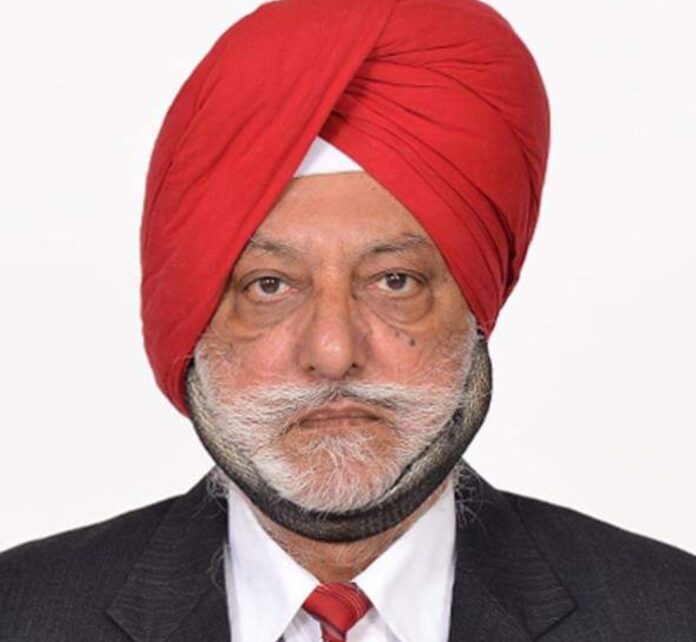Dealing with Falling Work Culture Ethics: A Practical Experience
Επιμέλεια: Εύα Πετροπούλου Λιανού
Dr. Dalvinder Singh Grewal Prof Emeritus Desh Bhagat University 1925, Basant Avenue, Ludhiana dalvinder 1945 @gmail.com, 09815366726
Dr Dalvinder Singh Grewal dwells on the falling work culture in Ethics, particularly in the field of Engineering – a telling account which can make us desperate….. Are we at the Precipice? Have all moral considerations left us? What kind of a world we have created? Can it sustain for long? If bridges fall as soon as they are inaugurated, what can be said of our Civilization? Dr. J.S. Anand
Ethics in work culture are the values related to conduct at the work place. These are explained here with the help of an incidence connected with my experience in engineering profession.
After my 35 years of dedicated, committed and disciplined life, I returned to Punjab in 1996 and had a brief stint in industry and own business. Later I joined the teaching profession, As I reached the new office at the reporting time, I found a strikers’ group squatted on main gate fully engaged in slogan-shouting, stressing on ‘hai, hai’ more than anything. I inquired about the official from the security guard. He guided me to the mess closeby. I lingered to the mess and reached the room of the officer. He was in bath. As I knocked; pat came the voice, “Kaun hai abe? Chain se nahane bhi nahin dete?” To make him hear, in the sound of shower, I had to shout at the top of my voice to explain. A minute later door opened and he was in his towel, not even having properly cleaned,” I am sorry sir. I did not recognise you. I am delighted to receive you sir.”
After making arrangements for my stay, I was asked to relax till the strike was over. I inquired the reasons for the strike. The employees had not been getting their dues; it had not come from the government. Rather than relaxing, I wanted to try something. I went to the office again. The slogan shouting was intermittent. Mingling with them, I spoke to a few of them and got the required information. There has been a sense of mistrust between the college management and the association. Some staff members were also not behaving properly. Some association members were exploiting the situation. It needed changing attitudes, creating trust and establishing human dignities.
I did not waste time. I got the officer ready and went to the strikers again. The accompanying officer introduced me to the strikers. At the end he said, “He is a legal expert. If you do not mend your ways he is going to screw you.” Equally arrogant reply came from the crowd, “We have not worn bangles here.” I laughed at the arrogance from both sides. I coolly wished them and told them I was not there to hound them out; I was only to help them out. I would do my best to solve the problems once I was given the details of the problem. The president of the association explained their problem with lot of salt and sweet.
Hearing him, I narrated them an anecdote from my life, “Gentlemen, I too has been over-confidant like you; even as arrogant as some of you. This arrogance led me to misbehave with my subordinates. I started loosing temper occasionally. Once my senior watched my behaviour with a junior. He invited me for a cup of tea in his house in the evening without allowing me to know the real reason.
During talks he said, “Suppose your friend sends a person to you. How would you behave towards that person?”
“I would do whatever is needed”.
He again asked, “Suppose I send someone to you then?
“I would treat him extremely well; I would be very loving towards him because you had sent him”
He said, “Suppose that every person who comes to you has been sent to you by God?”
“God is great, so is His creation. I must love and respect him from the core of my heart.”
He laughed, “How do you forget this when you are dealing with your men? Remember that they all are sent by God?”
That was an eye opener for me. Not only this deflated my self-ego and stopped me from arrogant behaviour, it also taught me to love my men. It worked wonders in later part of my life. I could get anything done from my men through love.
Now you all are sent to me by God; I have come here to love and respect you; to live among you as in a family. I am sure you will bear me and trust me. I assure you I will do what ever is in my power; incidentally I know the functioning at higher Headquarters and I have some friends there. May God help us to get your dues soon.”
I could soon see that their arrogance had turned into politeness. My showing total sympathy with them established a mutual trust and kindled a hope in them. I requested them to give me some time, as I was new. They agreed. Later the progress was explained to the boss, who too showed reasonableness and accepted to give me a try. They were allowed to open their heart out to the boss. This cemented the trust. This mutual trust worked wonders. I worked with them very closely and it did not take long to solve the problem. Later we formed a committee to look into such problems periodically and it worked fine. Any employee was allowed to meet the higher ups on a particular day; this increased approachability and decreased distances.
I continued making deep observations into the ethical values and attitudes in the population around and found that there was a general neglect. This trend in weakening ethics in work culture had percolated deep into the profession. I found groupism, rivalry, skirmishes and tensions prevailing. There was overall environment of mistrust. The teachers wasted more time in backbiting and labeling with allegations than preparing their lectures. Academic environment was missing. Time had lost its value and gross in-discipline was the virtue. The students used drugs frequently and on special checks lethal weapons were found hidden in their rooms.
Ethics is a science of morals, a system of moral principles; rules of conduct. It deals with fundamental human relationships- how we think and behave towards others and how we want them to think and behave towards us. Ethical Principles are guides to moral behaviour. e.g., in most societies ‘truth’, ‘love’ ‘compassion’ ‘sincerity’ ‘loyalty’ ‘moral courage’, honesty, keeping promises, helping others and respecting the rights of others are considered ethical. Religious beliefs are a major source of ethical guidance for many.
‘Values represent the conviction that a specific mode of conduct or end-state of existence is personally or socially preferable to an opposite or converse mode of conduct or end-state of existence.’ In a profession ‘adherence to time’, ‘discipline’, ‘commitment’, ‘responsibility’, ‘sincerity’, dedication’, ‘courtesy’, ‘knowledge’, ‘quality of work’, ‘sense of excellence’, etc., may be the most sought after positive values and lying, stealing, deceiving and harming, ‘self before service attitude’, ‘lack of patience’, ‘non-completion of work in time’, ‘poor quality of work’, ‘lack of smoothness, finish and excellence’, ‘general in-discipline’ ‘unnecessary arguments’, ‘frequent conflicts’, ‘non-development in professional standards’, ‘corrupt practices’, ‘unethical conduct’, ‘violence’, may be the most rejected values.
Engineering is a profession of gentlemen, whose ethical values are embedded in building the society. A gentleman has been defined as “an honest man, a man with a sense of duties and obligations of his position, whatever it may be, a man who tells the truth, a man who gives to other their due, a man considerate to the weak, a man who has principles and stands by them, a man who is not elated by good fortune and not too depressed by bad, a man who is sincere and committed a man who is trusted”.[1] Compassion, truth, honesty, righteous conduct, goodness, courteous behaviour, humility, self-sacrifice, service before of service, contentedness, peace, non-violence, sense of brotherhood, love, welfare of others, moral courage, respect for nature etc., are some of the key virtues of a gentleman.
To this writer’s surprise, these values were more often flouted than followed. The reason generally given was: “Do in Rome as the Romans do’. “Why blame engineers? The entire society is flouting the basic human ethical standards.”
Engineers have special obligations. They are from the upper strata of society, if not the top. Their main responsibility is to build, develop and change as per the requirements of the society, change for the better obviously. As per old adage they have to, “do good and be good”, and with the modern global requirement they have to “create excellence and be excellent.
Why this situation? Some of the reasons are discussed below.
The first major reason remains the inability to rightly adjust to the fast changing cultural and social values caused by global change. Indian cultural and social values have been changing regularly with the impact of foreign cultures and values. The invasions by the Mughals and the British were not as far affecting as has been the cultural invasion through media. The naked falsehood, merciless violence, inhuman treacheries and mesmerizing materialism being continuously propagated on 1000 odd TV channels, countless websites and newspapers and magazines on glazed paper day in, day out have impacted Indian minds with ‘increasing materialistic desires’, ‘self before service attitudes’, ‘impatient behaviour’, ‘disobedience’, ‘easy life patterns’, ‘unethical conduct’, ‘violence’, ‘indignity to women’ and above all ‘a sense of insecurity’. Incidentally most popular TV serial is ‘Kaun Banega Karorepati’; which has gambling as its theme.
The second major reason is lack of counter-mechanism. Sensing the change, we would have evolved a mechanism. This we have not. The amount of uncensored, unethical, unproductive material has been pouring into India, is a matter of great concern, but our society in general and the Government Machinery in particular has failed to have a timely check on this. We have not only allowed foreign values to dominate Indian scene but also allowed our own values to deteriorate and did not do much to propagate our own culture to counter the foreign culture.
The third major reason is the direction of our teaching. In ancient times the sages and gurus were the guides for practising ethical values; in the medieval period gurus and elders helped them acquire basic Indian ethics and during British times, the teachers in schools and parents at home taught moral principals. After independence, the pattern of the British was followed, however, over a period, possibly due to the impact of communism, the teaching of human values gradually diminished. With the technology advancement, social sciences lost to science and allied subjects. Teaching of moral values was reduced to minimum while its practical application became near zero. The breaking joint family system and the increasing demand to earn kept both mother and father away from guiding and supervising their children on moral values and allowed them to glue on to TV; which had more vices than virtues. The young minds got attracted to these vices easily and started practicing what they see on TV and films.
The fourth major reason is the practice of ritualism and not the true religions. All religions teach, Unity of God, Universal Brotherhood, truth, love for all and hatred towards none; goodness, peace, contentedness etc., and the true saints practiced it. However, those who do not understand religion rightly get into fanaticism and ritualism. For example the principle of universal brotherhood is so flouted by certain fanatics that they use force to make others accept their religion. Mayhem has been often caused on this account. The name of religion is thus used as a tool to communalism. With this the insanity, social balance and fabric of universal brotherhood is broken.
The fifth major reason is the wrong description and application of the meaning of secularism. Though secularism is based on allowing every person to follow his own religion and not to interfere in any other religion; it has been taken to be as following of no religion. With this the ethics and value system have gone to the background. The structure has become more important than the base; base getting moth-eaten. Here lies the tragedy of a nation. The nation which once was the beacon light of religion and culture for the world, is now known as the shameless imitator of western culture. Indians boast to be more English than the English.
The sixth major reason is a systematic exclusion of lessons on religion, ethics and moral values from our school texts. On the name of secularism, the books on national level and in some states, were devoid of teaching true religious, ethical and moral values. Even the lives of saints were also taught on pure historical point of view rather than on the religious and ethical values they preached. Hence students found no suitable guidance from their curriculum on religion and ethics.
Numerous other such reasons can be listed but the essence remains that the true Indian values now appear to be vanishing among the average Indians. This has affected the professional ethics as well.
Engineers have special role in society as has been stated in society. They are primary responsible for basic development of the nation and setting up a basic industrial, agricultural, communication, transportation, defence structures. On the whole the engineering have been performing their jobs quite satisfactorily, yet they too have been found to be afflicted with the ills stated in earlier paragraphs.
There are instances where self-seeking engineers have trampled over the less privileged. Also there are cases where they were found to hace neglected their duties deliberately. There are some cases of corrupt practices and corruption too. The fall of the Machhiwara bridge on river Satlej immediately after its inauguration, the fall of multi-storeyed buildings in Ahmedabad during recent earthquake due to use of incorrect materials; the cases of corruption against PSEB engineers for providing connections to some factories and tube-wells and also for irregularities in calling tenders are quite frequently read in the papers these days. The treatment with the work force by some engineers specially in the industry has also been often been pointed out by the courts. There are also quite frequent reports of non-completion of work in required time. Absenteeism, late-arriving, non-adherence to laid down standards are some other features of culture among engineers. Even though these are few and far between cases, yet considering the position of engineers in society, these cannot be taken lightly.
The work culture among the engineering profession too thus needs to be improved. The steps to be taken for general improvement in ethical and moral values include the following:
- The teaching of moral and ethical values from the very young stage and to be continued till the education is completed. For engineers special subject on ethical values must be introduced.
- The teaching in schools, colleges and technical teaching institutes must be so designed that the moral and ethical values are inculcated cumulatively and the materialist attitudes are curbed.
- The teachers must set examples of moral and ethical values and should lead the students.
- There must be continuous and regular assessment of students in their moral and ethical virtues. Final grading system should include special scales for moral and ethical standards e.g., a student with grade AZ should depict that he has attained ‘excellence’ in learning but has poor moral standards. This must also affect his employment prospectus.
- The industry and services must make it compulsory to assess the moral and ethical values of an employee during the period of reporting. All promotions and transfers should be based on these reports.
Lastly I recommend that each company and institute must have some ethical code of conduct. The code of conduct adopted by IEEE is given as a guideline;
We, the members of the IEEE, in recognition of the importance of our technologies in affecting the quality of life throughout the world, and in accepting a personal obligation to our profession, its members and the communities we serve, do hereby commit ourselves to the highest ethical and professional conduct and agree:
1. To accept responsibility in making engineering decisions consistent with the safety, health, and welfare of the public, and to disclose promptly factors that might endanger the public or the environment;
2. To avoid real or perceived conflicts of interest whenever possible, and to disclose them to affected parties when they do exist;
3. To be honest and realistic in stating claims or estimates based on available data.
4. To reject bribery in all its forms;
5. To improve the understanding of technology, it’s appropriate application, and potential consequences.
6. To maintain and improve our technical competence and to undertake technological tasks for others only if qualified by training or experience, or after full disclosure of pertinent limitations.
7. To seek, accept, and offer honest criticism of technical work, to acknowledge and correct errors, and to credit properly the contributions of others.
8. To treat fairly all persons regardless of such factors as race, religion, gender, disability, age, or national origin.
9. To avoid injuring others, their property, reputation, or employment by false or malicious action;
10. To assist colleagues and co-workers in their professional development and to support them in following this code of ethics. [2]
[1] Taya Zinkin in ‘Opinion’, 3 Nov 1981.
































